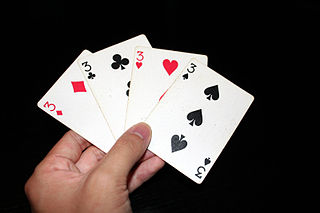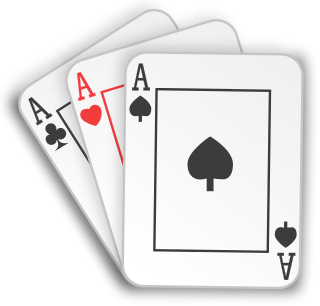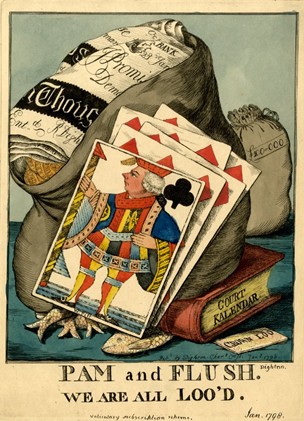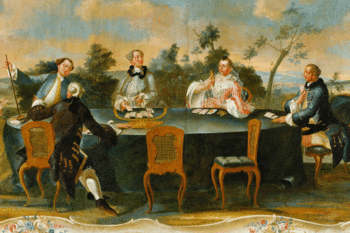
Blackjack is a casino banking game. It is the most widely played casino banking game in the world. It uses decks of 52 cards and descends from a global family of casino banking games known as "twenty-one". This family of card games also includes the European games vingt-et-un and pontoon, and the Russian game Ochko. The game is a comparing card game where players compete against the dealer, rather than each other.

Games available in most casinos are commonly called casino games. In a casino game, the players gamble cash or casino chips on various possible random outcomes or combinations of outcomes. Casino games are also available in online casinos, where permitted by law. Casino games can also be played outside of casinos for entertainment purposes, like in parties or in school competitions, on machines that simulate gambling.

Pinochle, also called pinocle or penuchle, is a trick-taking ace–ten card game, typically for two to four players and played with a 48-card deck. It is derived from the card game bezique; players score points by trick-taking and also by forming combinations of characters into melds. It is thus considered part of a "trick-and-meld" category which also includes the game belote. Each hand is played in three phases: bidding, melds, and tricks. The standard game today is called "partnership auction pinochle".

Baccarat or baccara is a card game played at casinos. It is a comparing card game played between two hands, the "player" and the "banker". Each baccarat coup has three possible outcomes: "player", "banker", and "tie".

Gin rummy, or simply gin, is a two-player card game variant of rummy. It has enjoyed widespread popularity as both a social and a gambling game, especially during the mid twentieth century, and remains today one of the most widely played two-player card games.

Texas hold 'em is one of the most popular variants of the card game of poker. Two cards, known as hole cards, are dealt face down to each player, and then five community cards are dealt face up in three stages. The stages consist of a series of three cards, later an additional single card, and a final card. Each player seeks the best five-card poker hand from any combination of the seven cards: the five community cards and their two hole cards. Players have betting options to check, call, raise, or fold. Rounds of betting take place before the flop is dealt and after each subsequent deal. The player who has the best hand and has not folded by the end of all betting rounds wins all of the money bet for the hand, known as the pot. In certain situations, a "split pot" or "tie" can occur when two players have hands of equivalent value. This is also called "chop the pot". Texas hold 'em is also the H game featured in HORSE and HOSE.

Basset, also known as barbacole and hocca, is a gambling game using cards, that was considered one of the most polite. It was intended for persons of the highest rank because of the great losses or gains that might be accrued by players.

Faro, Pharaoh, Pharao, or Farobank is a late 17th-century French gambling game using cards. It is descended from Basset, and belongs to the Lansquenet and Monte Bank family of games due to the use of a banker and several players. Winning or losing occurs when cards turned up by the banker match those already exposed.
A martingale is a class of betting strategies that originated from and were popular in 18th-century France. The simplest of these strategies was designed for a game in which the gambler wins the stake if a coin comes up heads and loses if it comes up tails. The strategy had the gambler double the bet after every loss, so that the first win would recover all previous losses plus win a profit equal to the original stake. Thus the strategy is an instantiation of the St. Petersburg paradox.

Debt is an American game show hosted by Wink Martindale which aired on Lifetime from June 3, 1996, to August 14, 1998. It was produced by Buena Vista TV, a part of The Walt Disney Company. The show featured contestants who were trying to earn money to get out of debt. It had a similar format to Jeopardy!, on which contestants answered trivia. However, it targeted a younger audience and placed a larger emphasis on popular culture.

Deal or No Deal is an Australian game show that airs on Network 10 hosted by Grant Denyer, and premiered on Janurary 29, 2024. The program was previously broadcast on the Seven Network from 13 July 2003 to 4 October 2013. It was the first international version of the game show, after the original Miljoenenjacht from the Netherlands. It was the first of the versions to use the Deal or No Deal name. It was hosted by Andrew O'Keefe for its initial 10-year run.

Teen patti is a gambling card game. Teen Patti originated in India and is popular throughout South Asia. It originated in the English game of three-card brag, with influences from poker. It is also called flush or flash in some areas.
The following is a glossary of poker terms used in the card game of poker. It supplements the glossary of card game terms. Besides the terms listed here, there are thousands of common and uncommon poker slang terms. This is not intended to be a formal dictionary; precise usage details and multiple closely related senses are omitted here in favor of concise treatment of the basics.

Lanterloo or Loo is a 17th-century trick taking game of the trump family of which many varieties are recorded. It belongs to a line of card games whose members include Nap, Euchre, Rams, Hombre, and Maw. It is considered a modification of the game of "All Fours", another English game possibly of Dutch origin, in which the players replenish their hands after each round by drawing each fresh new cards from the pack.
Jeopardy! is an American television game show created by Merv Griffin. The show is a quiz competition that reverses the traditional question-and-answer format of many quiz shows. Rather than being given questions, contestants are instead given general knowledge clues in the form of answers and they must identify the person, place, thing, or idea that the clue describes, phrasing each response in the form of a question.
Roger Alan Craig Jr. is an American game show contestant, computer scientist, data scientist, and machine learning consultant. He held the record for highest single-day winnings on the quiz show Jeopardy! from September 14, 2010 to April 9, 2019. In 2011, Craig returned to win the Jeopardy! Tournament of Champions. In 2014, he competed in the Battle of the Decades tournament, finishing third overall behind Brad Rutter and Ken Jennings.

Twenty-one, formerly known as vingt-un in Britain, France and America, is the name given to a family of popular card games of the gambling family, the progenitor of which is recorded in Spain in the early 17th century. The family includes the casino games of blackjack and pontoon as well as their domestic equivalents. Twenty-one rose to prominence in France in the 18th century and spread from there to Germany and Britain from whence it crossed to America. Known initially as vingt-un in all those countries, it developed into pontoon in Britain after the First World War and blackjack in Canada and the United States in the late 19th century, where the legalisation of gambling increased its popularity.

Mouche, also known as Lanterlu, is an old, French, trick-taking card game for two to six players which has elements, such as bluffing, reminiscent of the much later game of poker. It is a member of the Rams family of games and, although it is a gambling game, often played for small stakes, it is also suitable as a party game or as a family game with children from the age of 12 upwards. It is named after the mouche, a term that variously refers to its winning hand, the basic stake and the penalty for failing to take any tricks. Although also called Bête, it should not be confused with the older game of that name from which it came and which, in turn, was a derivative of Triomphe.

James Holzhauer is an American game show contestant and professional sports gambler. He is the third-highest-earning American game show contestant of all time. Holzhauer is best known for his 32-game winning streak as champion on the quiz show Jeopardy! from April to June 2019, during which he set multiple single-game records for winnings, and for winning the following Tournament of Champions that November.
Jeopardy! is an American quiz game show in which contestants use certain strategies and skills to increase their chances of winning each game, win the most games, and ensure large winnings.














